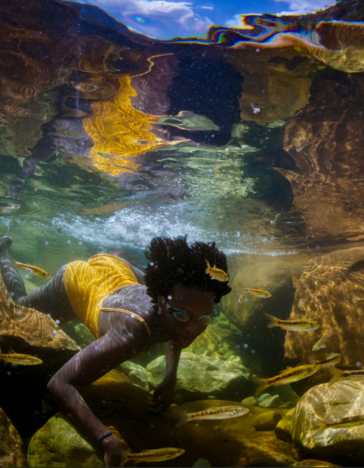
Africa’s freshwater fishes vital for millions of people but one-quarter face extinction
Africa’s dazzlingly diverse freshwater fishes are critical for the health, food security and livelihoods of tens of millions of people across the continent as well as the overall health of freshwater ecosystems, but they are under ever increasing pressure with over one quarter already threatened with extinction, according to a report published today by 18 regional and international organizations ahead of a global conference on wetlands in Zimbabwe.
Africa’s Forgotten Fishes details the extraordinary variety of fish species across the continent – with at least 3,281 swimming in its rivers, lakes and other wetlands. The report celebrates this wealth of species – from the amazing radiation of cichlids in Africa’s Rift Valley lakes to two truly ancient lineages that can still ‘breathe’ air, from fishes that use electrical pulses to communicate to a fearsome predator that can catch barn swallows in flight, from the giant Nile perch to the tiny African turquoise killifish with the shortest life-span of any vertebrate.
The WWF-led report highlights the critical role of all these fishes in maintaining the health of Africa’s freshwater ecosystems and supporting societies and economies across the region.
Over 3 million tonnes of freshwater fish are caught each year in Africa, representing almost 30 per cent of the global freshwater fish catch – and this figure is definitely an underestimate due a lack of data, especially for small scale fisheries. This annual catch feeds the highest per capita consumption of freshwater fish of any continent in the world and employs over 3 million people as well as playing a central role in the cultures of many Indigenous Peoples.
“Africa is a global hotspot of freshwater fish diversity, but it’s also a hotspot of risk,” said Eric Oyare, WWF Africa Freshwater Lead. “When these fish disappear, we lose much more than species: we lose food and nutrition security, livelihoods and ecosystem balance. Declining fish populations are a red flag for the broader health of Africa’s freshwater ecosystems, which are life support systems for people and nature across the continent.”
But Africa’s freshwater fishes continue to be undervalued and overlooked by decision makers and at least 26 per cent of assessed species are now estimated to be heading towards extinction, with 170 species already listed as Critically Endangered by the IUCN Red List of Threatened Species. However, a staggering 536 species are considered Data Deficient, meaning too little is known about them to gauge their conservation status – and that the number of threatened species is likely far higher.
“The devastating decline in Africa’s freshwater fishes is an urgent call for national and regional efforts to save these species, which underpin not only the region’s societies and economies but also the health of the continent’s rivers, lakes and other freshwater wetlands,” said Kathy Hughes, co-author of the report and Global Biodiversity Lead at Wetlands International – one of the 18 partners. “Millions of people depend on these fishes, but undervalued and overlooked by decision makers, they are disappearing.”
The report highlights the unprecedented combination of threats that are driving the decline in Africa’s freshwater fishes, including habitat loss, hydropower dams fragmenting free flowing rivers, conversion of wetlands for agriculture and aquaculture, unsustainable sand mining, invasive species – and the worsening impacts of climate change. Together, these threats are devastating fishes and fisheries with catches of key species in the Zambezi floodplain dropping by up to 90 per cent, while the population of the Karonga tilapia, one of Lake Malawi’s iconic ‘chambo’ food fishes, has declined by 94 per cent.
But solutions exist: from successful community conservation zones to 20 African countries joining the global Freshwater Challenge – the largest freshwater restoration and protection initiative in history, which builds on the 30 per cent targets for the protection and restoration of inland waters in the Kunming-Montreal Global Biodiversity Framework.
“It’s not too late. We can protect and restore Africa’s freshwater ecosystems and safeguard its dazzlingly diverse fishes,” said Hughes, who is also the co-chair of the IUCN Freshwater Fish Specialist Group. “By factoring the future of fishes and fisheries into decisions, countries can chart a new course for Africa’s rivers, lakes and wetlands – securing food and jobs for millions, boosting biodiversity and enhancing resilience to climate change.”
Along with protecting and restoring freshwater ecosystems, African countries can also adapt the Emergency Recovery Plan for Freshwater Biodiversity. This comprehensive 6-pillar plan, which includes letting rivers flow more naturally, improving water quality, and ending unsustainable exploitation of resources, can deliver solutions at the scale necessary to reverse the collapse in Africa’s fish populations. Critically, local communities and their unique knowledge must be at the heart of solutions.
The report comes out two weeks before the 15th Conference of the Contracting Parties to the Convention on Wetlands (COP15), which will bring together representatives of over 170 countries to chart a path toward great protection, restoration and sustainable management of the world’s wetlands.
African countries have a unique opportunity to lead by example, by putting freshwater ecosystems and fishes at the heart of conservation and development decisions.
“The future of Africa’s freshwater wetlands and freshwater fishes is inseparable from the future of its people,” says Itai Chibaya, WWF Zimbabwe Country Director. “We need bold action at Ramsar COP15 to safeguard and restore the freshwater life support systems of our continent.”
Along with WWF and Wetlands International, Africa’s Forgotten Fishes was produced in collaboration with the Alliance for Freshwater Life, Conservation International, Freshwater Research Centre, International Water Management Institute (IWMI), Freshwater Life, InFish, IUCN SSC, NatureMetrics, Re:wild, SHOAL, South African Institute for Aquatic Biodiversity (SAIAB), The Nature Conservancy, WorldFish, and WWT.

